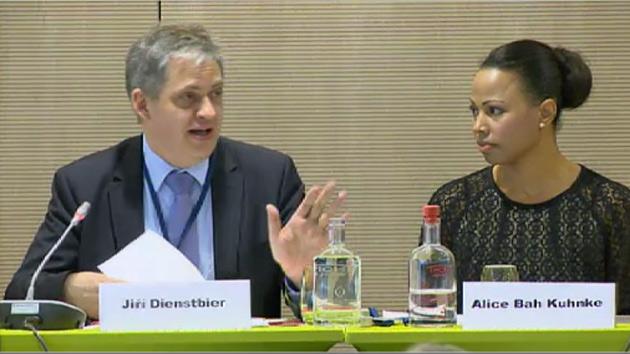Czech Human Rights Minister says Government is addressing discrimination in the schools

Czech Human Rights Minister Jiří Dienstbier says a planned amendment to the Schools Act and the institution of compulsory preschool education as of 2017 are examples of how the Czech Government is doing its best to handle criticism from the EU regarding discrimination against the Romani minority in the schools. Yesterday in Brussels the most important aspects of Romani inclusion into society were discussed by representatives of EU Member States, EU institutions and NGOs from the EU-28.
The European Commission is now researching the response sent by the Czech Republic to its formal request last year for information regarding the alleged discrimination of Romani children in the Czech education system. The matter could theoretically end up before the EU Court of Justice.
Dienstbier did not want to predict what conclusions the European executive might ultimately come to. He emphasized that the Czech Government is doing its best to solve these problems, mainly for the sake of Czech society itself.
EU Justice Commissioner Věra Jourová told the Czech News Agency that the Commission is waiting to see which amendments to the Schools Act will ultimately be approved. In their current form, she said the amendments seem to be tools for improving the situation.
The Commission is primarily concerned that children "from complicated socio-cultural backgrounds" be able to access mainstream education in mainstream schools. "With a good diagnostic technique and an individualized approach, we should be able to achieve a fundamental, rapid reduction in the percentage of Romani children in particular who are sent to special schools today," said the Commissioner, who was once a Czech Government minister.
Jourová also emphasized that in addition to be being satisfied with the law, actual results are mainly what is necessary. "We want to see the introduction of these things into practice," she stressed.
The Czech Government, she said, should come forward with guarantees that a new approach will begin to function soon. The law in and of itself will evidently not produce results until next fall.
The Czech authorities, however, should do their best to change the approach this year. "I have enormous respect for the law, but something can be done even before it takes effect," the Commissioner noted.
"If a certain segment of children are not receiving an education, they are handicapped for their entire lives on the labor market and in all social aspects. It is not in our interest to pass social exclusion on to another generation, the children are not to blame for this. They did not decide the kind of environment they were born into," Dienstbier said in an interview for the Czech News Agency and Czech Television.
The minister also reminded the press that the Czech Goverment adopted its Romani Integration Strategy to 2020 in February. In addition to passing an amendment to the Schools Act, he said it is also necessary to change financing mechanisms so the schools will have enough money to implement the new measures.
Both the EU and the Council of Europe have long criticized the Czech Republic for the persistently high number of Romani children identified as having "mild mental disabilities" and then being recommended for special education on that basis. The Czech Government Inter-ministerial Commission for Roma Community Affairs, according to Dienstbier, is proposing the cancellation of the "mild mental disability" category for the next school year so that, at a minimum, children entering first grade will do so in mainstream education.
"I think that would be a very significant step that could aid the situation and also improve the Czech Republic’s position in relation to the European Commission. It would be a strong argument," he said.